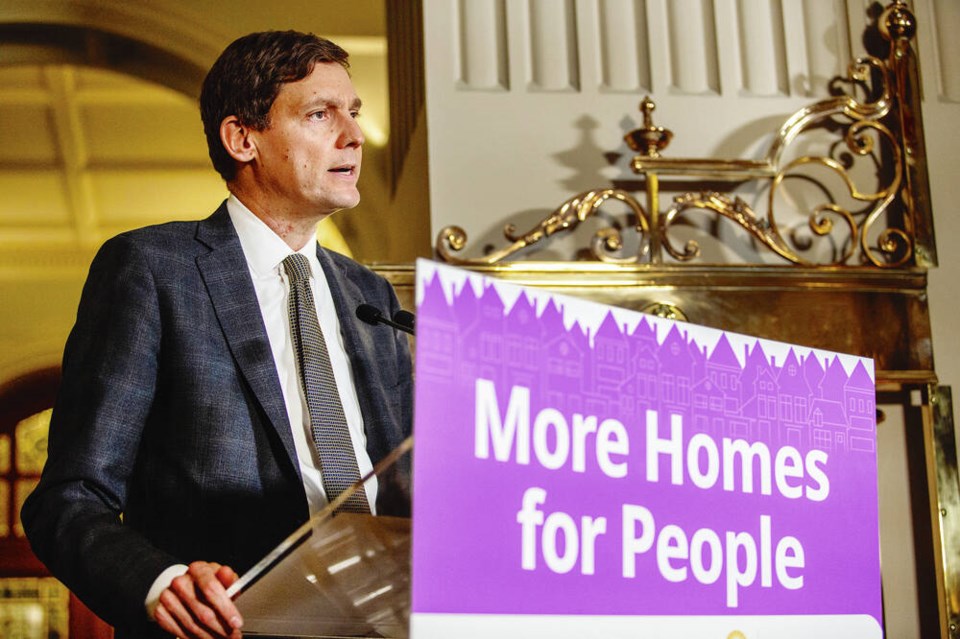The future, as demonstrated by A) the pandemic and B) the Canucks, can be wildly unpredictable.
Sometimes, though, we know exactly what to expect, at least as it pertains to rules, taxes, fees and whatnot. Here are a few of the changes that might affect you in 2023.
B.C. Affordability Credit — David Eby launched his premiership Nov. 18 by announcing a one-time payment of up to $164 per adult and $41 per child. How much you’ll get depends on how much money you make; the amount falls as income rises. A two-child family with an annual income of up to $43,051 will get $410. About 85 per cent of British Columbians will get something.
The money is due to show up in bank accounts via the Jan. 5 climate action tax credit payment.
B.C. Family Benefit — Beginning with the Jan. 20 payment, the province will add a “temporary enhancement” of up to $58.33 per child for each of the first three months of the year. Again, the amount depends on income. For a family with two kids, that means a total of up to $350 extra.
Housing — Canada’s two-year ban on foreigners buying houses takes effect Jan. 1. There are exemptions, though, that are meant to separate speculators from those creating a life here: permanent residents, workers who have regularly filed tax returns, certain students and people here while fleeing conflicts. Properties outside larger communities are also exempt.
Another federal measure, a house-flipping tax targeting people who sell homes within a year of purchasing them, also kicks in Jan. 1.
The provincial government has capped residential rent increases at two per cent for 2023.
B.C.’s speculation and vacancy tax is being expanded to North Cowichan, Duncan, Lake Cowichan, Ladysmith, Lions Bay and Squamish for the 2023 tax year.
New rules for younger workers — As of Jan. 1, the province will bar younger workers from doing jobs it deems too dangerous for them.
“The new rules outline certain jobs that require a minimum age of 18, such as work as a logger, jobs in smelters, in oil drilling or where there is a risk of exposure to certain harmful materials,” the province said. “For construction work, fish processing and some animal-processing work, a minimum age of 16 is deemed appropriate.”
Current employees who will reach the prescribed age by April 1 are exempt. So are those in training programs overseen by SkilledTrades B.C.
B.C. Hydro — After a 1.4 per cent decrease in 2022 (plus a one-time $100 cost-of-living-credit this month), B.C. Hydro is looking for rate increases of 2.0 per cent in 2023 and 2.7 in 2024.
ICBC — The province wants to freeze basic automobile insurance rates until 2025. If the utilities commission approves, that will mean five years since the last increase in 2020.
B.C. Ferries — Under a deal that saw B.C. Ferries get pandemic-recovery money from the province, annual fare increases were capped at 2.3 per cent through March 2024. On April 1 you can expect fares to increase by an average of that much across the fleet; some will be a little higher, some a bit lower.
Victoria transit — The bus system is also subject to a 2.3 per cent cap on fare increases, though there are no immediate plans to raise fares at all.
As of Jan. 2, there’ll be more weekday trips during peak times on routes serving post-secondary schools. There will also be more Sunday trips on route 70 Swartz Bay/Downtown, reflecting increased demand.
Canada Pension Plan — Workers earning more than $66,000 will see their paycheques docked an extra $254 in 2023.
Employment Insurance — Premiums will rise $49 a year for those making over $61,500.
Blue boxes — Recycle B.C. says changes are coming that will make recycling a greater variety of packaging more convenient to residents. Details to come early next year.
Camping — Heads up: A new reservation system is coming. At 7 a.m. Jan. 3, B.C. Parks will move to a rolling four-month booking window for many parks. As of that day, reservations will be available for arrivals up to May 3. On Jan. 4, May 4 arrivals will be available, and so forth.
Fishing licences — The province hasn’t increased freshwater angling licence fees and conservation surcharges since 2003, but is now pondering a proposal to do so. It says the lack of increases has made it hard to fund B.C.’s fish-stocking program and other services. Stay tuned.
The feds have yet to say what the fees for fishing tidal waters will be.
Booze — The 91原创 Taxpayers Federation estimates the federal liquor escalator tax will increase the excise taxes on beer, wine and spirits by 6.3 per cent on April 1. It’s enough to make you drink. Or not.
Minimum wage — Nothing scheduled yet, but the minimum wage, currently $15.65 an hour, has risen each June 1 since 2018.
No elections — OK, maybe this sounds like an odd one, but for only the second year in a decade B.C. is scheduled to go a full year without enduring a federal, provincial or local government general election.
Actually, the only other campaign-free year was 2016, but even then we had to watch as the President-Who-Must-Not-Be-Named brought his special blend of dignity and modesty to the White House, so that shouldn’t count either. Enjoy the respite.
>>> To comment on this article, write a letter to the editor: [email protected]




